HajjBnB? Riyadh looks to profit from pilgrims with new Umrah hosting scheme
Saudi Arabia will launch a new service allowing citizens to host 'Umrah' out of season pilgrims to Mecca, potentially allowing the monetisation of the ritual in an AirBnB-like scheme.
Abdulaziz Al-Wazzan, Saudi deputy minister of Hajj and Umrah, announced the initiative that allows Saudis to host pilgrims performing the Umrah up to five times per year.Wazzan said that the new scheme, dubbed ‘The Host’s Umrah’, would start soon.
“Residents are only allowed to host their first-degree relatives. However, Saudi citizens are permitted to host whoever they wish,” Al-Wazzan told Saudi daily Okaz.
He reiterated that “the host must look after them [the visitors] and serve them until they leave”.
The new scheme would allow hosts to accommodate up to 5 Umrah Performers per year, he said.
The Umrah is an Islamic pilgrimage to Mecca, Saudi Arabia. It can be undertaken at any time of the year, in contrast to the Ḥajj which has specific dates according to the Islamic lunar calendar.
Critics say the new scheme would allow private Saudi citizens to charge fees for the service, adding further costs to the already expensive trip to Saudi Arabia and turning a religious ritual into a money making scheme. Riyadh has also hiked up its Hajj visa costs by up to 500 percent.
The New Arab has contacted the Saudi Ministry of Hajj for comment but has not received a response by the time of publication.
Religious rituals constitute a vital source of revenues to the Arabian Gulf country.
Hajj currently makes up 20 percent of the kingdom’s non-oil economy.
As part of a Saudi Arabia’s plan to alleviate its dependency on oil revenues and diversify its economy sources, the government aims to boost the number of foreign pilgrims to 30 million per year by 2030.
But Muslims have often complained of the high cost of the ritual and decried Riyadh's increasing efforts to monetise the sacred ritual.
Saudi Arabia's critics have also flagged the consistent politicisation of the Hajj, as Riyadh has used its Hajj visas and logistical control of the Muslim world's holiest sites to punish and harass citizens of its geopolitical foes.
Follow us on Twitter: @The_NewArab





 Follow the Middle East's top stories in English at The New Arab on Google News
Follow the Middle East's top stories in English at The New Arab on Google News


